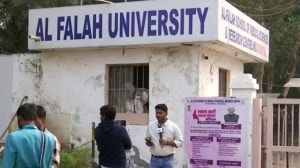Ritu Sarin is Executive Editor (News and Investigations) at The Indian Express group. Her areas of specialisation include internal security, money laundering and corruption. Sarin is one of India’s most renowned reporters and has a career in journalism of over four decades. She is a member of the International Consortium of Investigative Journalists (ICIJ) since 1999 and since early 2023, a member of its Board of Directors. She has also been a founder member of the ICIJ Network Committee (INC). She has, to begin with, alone, and later led teams which have worked on ICIJ’s Offshore Leaks, Swiss Leaks, the Pulitzer Prize winning Panama Papers, Paradise Papers, Implant Files, Fincen Files, Pandora Papers, the Uber Files and Deforestation Inc. She has conducted investigative journalism workshops and addressed investigative journalism conferences with a specialisation on collaborative journalism in several countries. ... Read More
Work begins for swift judicial redressal
In this season of reforms, the Government is finally turning its attention to a problem that hasn’t been addressed for long. It wants t...

In this season of reforms, the Government is finally turning its attention to a problem that hasn’t been addressed for long. It wants to improve the judicial redressal system: in short, ensure that justice is delivered swiftly, cheaply.
Along with new tools like plea bargaining—which allows the defendant to negotiate with the prosecution before the trial and eliminates protracted legal battles—the Government is keen to put a machinery in place to make sure that the reforms take off.
The Law Ministry has estimated a cost of Rs 2,514 crore to implement the proposals. A special cell will be set up to monitor the progress of the reforms.
Cabinet Secretary B K Chaturvedi, who was given a presentation by Departments of Justice and Legislature earlier this month, told The Indian Express: ‘‘Administrative reforms cannot work effectively within the existing judicial system. The idea is to have low cost redressal of grievances for the common man and fast track clearances for high-value litigation at the same time.’’
Chaturvedi said that he had asked the Law Ministry to prepare a time-bound agenda for action within a month and for the implementation cell to be headed by a Joint Secretary level officer.
Apart from computerising the system and setting up fast track courts, the proposals prepared by T K Vishwanathan, Secretary, Legislative Department, include:
|
From the toolbox,
other solutions |
||
|
• After appointment, judges, including those of High Courts, should be subjected to intensive training for 18-24 months |
||
• Introducing Plea Bargaining as a tool to reduce delays and backlogs. The defendant will agree to plead guilty in exchange for certain concessions from the prosecution
• The statute book will be ‘‘de-criminalised’’. In other words, some matters will be taken out of the criminal arena and the wrongdoers will face financial penalties instead
• The setting up of commercial courts in each state or group of states to deal with high-value disputes. Such courts can also be staffed by retired judges from High Courts and can follow fast track procedures
• Compounding of cases under provisions of the Criminal Procedure Code. Section 320 of the Code provides for compounding two types of cases: with the consent of the parties and through the courts. This also finds mention in the 177th Report of the Law Commission.
• Introduction of an elaborate Electronic Judicial Resource Management System. Proposals include transmitting court orders, judgments and summons via email. Along with this, the Supreme Court and High Courts are proposed to be linked through a high speed broad band Wide Area Network (WAN) and for judges to maintain an electronic diary for maintaining records of hearings.
• While the Supreme Court has been fully computerised, the budgetary support for upgradation of 21 High Courts is awaited. Besides this, computerisation of 14,948 subordinate courts is on the cards at an estimated cost of Rs 443 crore.
To back the proposals of the Legislative Department, the Justice Department has given the Cabinet Secretariat the broad financial implications.
While the cost of computerisation (above the existing budgetary outlays) have been pegged at Rs 200 crore, the setting up of 1,300 more fast track courts (over a four-year period) has been estimated at Rs 1,314 crore and the creation of physical infrastructure (till the year 2008) estimated at Rs 1,000 crore.





- 01
- 02
- 03
- 04
- 05



























